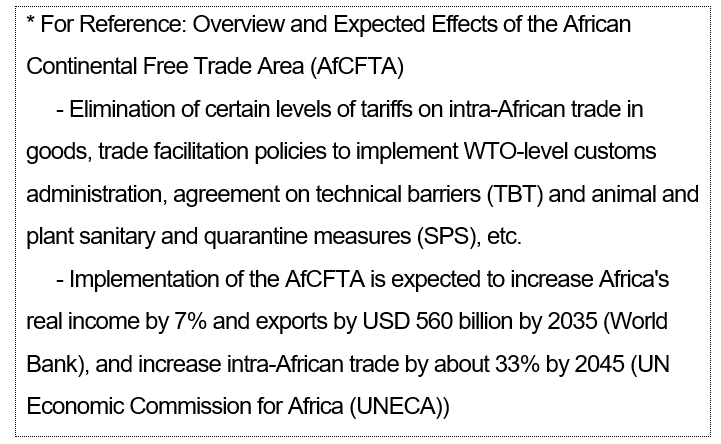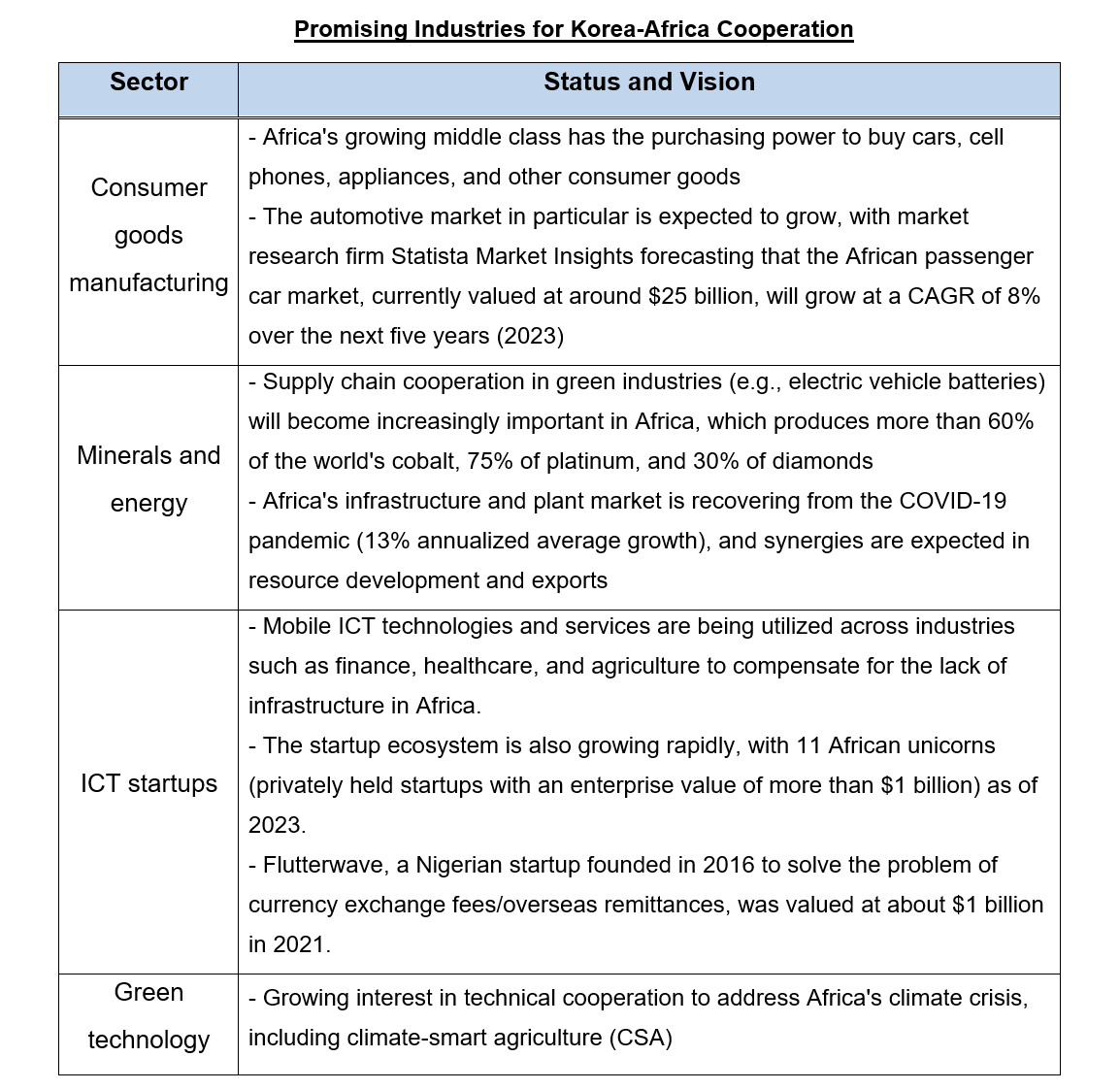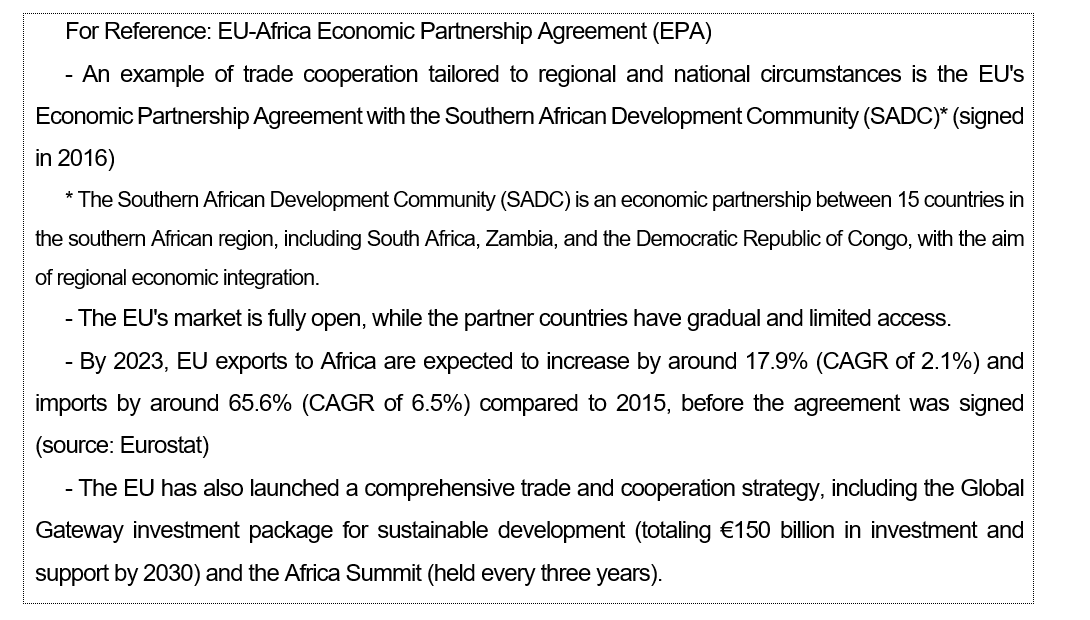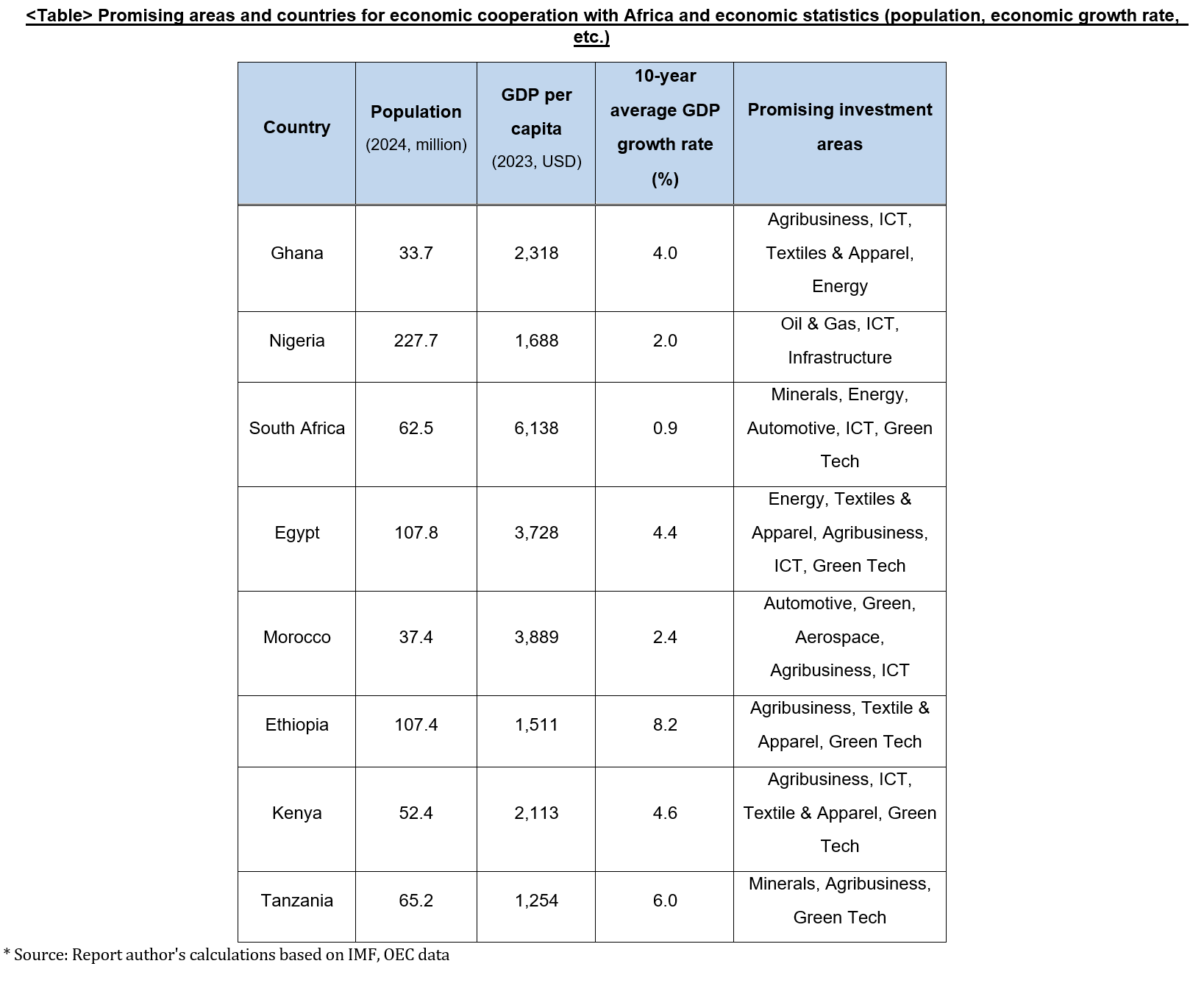News & Events
Press Releases
Areas and Tasks for Korea-Africa New Industry Cooperation
|
New global growth engine Africa is a land of opportunity for Korean business
• Partnerships should be built between Africa, a young continent primed for growth, and Korea centered on new industries
• Focus on promising cooperation areas such as consumer goods, minerals, energy, ICT startups, and green technology
With the growing importance of Africa as a young continent with high growth potential, the following areas have been proposed as key areas of cooperation between Korea and Africa: (1) consumer goods manufacturing, (2) minerals and energy, (3) ICT startups, and (4) green technology.
Africa's growth rate is among the highest in the world, thanks to its free trade area
The competitiveness of Africa, which has recently garnered attention for its high growth rate, lies in its young population, abundant resources, geographical proximity to the US and EU markets, and infra-regional free trade. According to the United Nations, Africa's population, which currently stands at 1.48 billion (18.3% of the world's population), is expected to grow to 2.5 billion by 2050. The median age 1 is also low at 19, compared to South Korea (45.1) and the rest of the world (30.7).
1 Median age: refers to the age of the person in the middle when the entire population is sorted by age; a low median age indicates a relatively young population
Africa is also rich 2 in key resources such as lithium and cobalt, which are key raw materials for green industries such as electric vehicle batteries**. Geographically, Africa's strengths include its proximity to Europe and the Middle East, as well as its strategic location for maritime trade with the Americas and India.
2 The Democratic Republic of Congo supplies 74% of global cobalt production and Zimbabwe supplies 19% of global lithium production.
Another key factor driving Africa's growth is the African Continental Free Trade Area (AfCFTA), which was launched in 2019. Created to develop the continent as one giant market, the AfCFTA involves 54 African countries and is expected to serve as a platform for integrating mutual trade policies to boost intra-regional trade and increase Africa's influence in global trade.

This economic growth strategy has led to Africa's recent rapid growth. According to the African Development Bank (AfDB), 11 of the top 20 countries with the highest forecasted economic growth rates in 2024 are African countries [Niger (11.2%), Senegal (8.2%), Libya (7.9%)], and three African countries are also on the fDi Markets and IMF's top 10 most promising countries for outbound investment in 2024 [Kenya (#3), Namibia (#5), and Morocco (#8)].
Cooperation between Africa, the Rising Star of the Global Economy, and Korea is Low
Despite Africa's high growth rate, cooperation between Korea and Africa is low. Africa accounts for only 1.3% of Korea's trade volume (KITA, 2023) and only 0.5% of Korea's global direct investment (Export-Import Bank of Korea, 2023).
This is because Africa is a geographically remote and unfamiliar market to Korea, and Korea's perception of Africa has been limited to resource development and infrastructure, or ODA (official development assistance).
Promising areas for new cooperation between Korea and Africa: ① Consumer goods manufacturing, ② Minerals and energy, ③ ICT startups, ④ Green technology
"To strengthen Korea-Africa cooperation, Korea should expand into promising sectors that are currently driving Africa's growth, such as consumer goods manufacturing, minerals and energy, ICT-based startups, and green technology," the report said.
Furthermore, the author argued that to build cases of successful partnerships, there should be more high-level meetings such as the 2024 Korea-Africa Summit, and institutional support should be put in place to lead to expanded private sector cooperation.

Task #1 for Expanded Korea-Africa Cooperation: Strengthening Korea-Africa Customized Trade Cooperation
The report’s author explained the need to strengthen customized trade cooperation to expand Korea-Africa cooperation, citing the example of Economic Partnership Agreements (EPAs) for countries in emerging regions such as Africa.
EPAs were presented as a realistic way to strengthen trade cooperation with Africa, as unlike general free trade agreements (FTAs), they aim not only to reduce trade barriers between countries but also to strengthen comprehensive cooperation such as development support and technology transfer to other countries. This is because Africa's economic and industrial development differs from country to country and region to region, requiring customized trade and investment agreements to meet the needs of each region and country.

Task #2 for Expanded Korea-Africa Cooperation: Expanding Policy Finance to Support Korean Companies Investing in and Entering Africa
The report also found that policy financing for enterprises needs to be expanded so that Korean companies can invest in and expand their presence in Africa. Many African countries have credit ratings that do not meet the OECD's criteria for policy finance eligibility, making it difficult to access corporate loans and policy finance.
Currently, Africa accounts for 2.8% of the Export-Import Bank of Korea's total export credit disbursements and 27.9% of EDCF disbursements, and 6.7% of K-Sure's short-term export insurance support.
* At the 7th Korea-Africa Economic Cooperation (KOAFEC) Ministerial Meeting on September 23, 2023, the Ministry of Economy and Finance pledged to support a financial package for Africa of about USD 6 billion over the next two years (USD 1.5 billion EDCF, USD 4.3 billion export finance, and USD 24 million AfDB trust fund).
The author explained that to promote financial support, it is necessary to accumulate experience in utilizing the resources of international development finance institutions and multilateral development banks and to develop a cooperation model that can attract the participation of international development finance institutions (e.g. World Bank, AfDB Trust Fund) in the future.
"On the back of the 2024 Korea-Africa Summit and with the need for cooperation between Africa and Korea becoming greater than ever, Korean companies should utilize Africa as a new growth engine by expanding their presence not only in traditional resource sectors such as minerals and energy but also in new industries such as ICT and green industries," said Bong-man Kim, Vice President of the International Network Department at FKI.
[Attached] Promising areas and countries for economic cooperation with Africa (Table)
